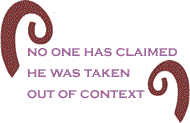Let’s
see if I got this right. The prime minister of an allied government
disses the U.S. secretary of state, says he went over her
head and got her boss, the President of the United States, to countermand her intention to
vote for a resolution at the United Nations and gloats over the
fact that she was “left pretty embarrassed.” The president remains
silent on the matter and the State Department calls said foreign
leader a liar. Yet the controversy lasts barely a 48-hour new cycle;
two days after this probably unprecedented chain of events, most
major U.S. media pretty much dropped what the Washington Post
had described as a “rare public dust-up between the Bush administration
and the Israeli government.”
On
January 14, Israeli radio reported that the office of Israeli Prime
Minister, Ehud Olmert, was sticking by the original allegation that10
minutes before the scheduled UN Security Council vote, he phoned
the President of the United States and told him, “You can’t vote
for it” and Bush quickly contacted Secretary of State Condoleezza
Rice and “gave an order to the Secretary of State.” “She was left
pretty embarrassed, abstaining on a draft resolution she organized
herself,” Olmert said.
“I
said, ‘Get me President Bush on the phone’,” said Olmert. “They
said he was in the middle of giving a speech in Philadelphia.
I said I didn’t care: ‘I need to talk to him now’. He got off the
podium and spoke to me.”
Rice
later called the account “fiction.”

Did
it really happen that way? Who knows? In the murky world of Middle
East diplomacy - especially Washington’s dealings with Tel Aviv - the truth
could lay anywhere. One thing is certain, however, for an allied
government leader to publicly undercut an African American woman
in Rice’s position should be a serious matter to the U.S. ... and to her.
“Rice’s
decision not to vote on the resolution surprised some U.S. allies in the Arab world, who later said
they had been told the Americans were going to support the resolution,
which ultimately passed the Security Council 14-0,” reported the
Post. “Just before the Security Council convened to consider
the resolution, senior British and Saudi officials indicated they
believed the vote would be unanimous.”
 The
day after the UN vote, Julian
Borg, diplomatic editor at the Guardian (UK) wrote that “The
US change of mind came at the last moment, as a result of White
House intervention following a call from Olmert. Rice was overridden
and in the final vote, the US
abstained. In her remarks afterwards, Rice made clear she backed
the resolution, saying the US
“fully supports” its goals, text and objectives. She said the US had abstained because Washington ‘thought it important to see the outcomes of the Egyptian
mediation … in order to see what this resolution might have been
supporting.’ However, that was an argument the US had made when the text was drafted.” The
day after the UN vote, Julian
Borg, diplomatic editor at the Guardian (UK) wrote that “The
US change of mind came at the last moment, as a result of White
House intervention following a call from Olmert. Rice was overridden
and in the final vote, the US
abstained. In her remarks afterwards, Rice made clear she backed
the resolution, saying the US
“fully supports” its goals, text and objectives. She said the US had abstained because Washington ‘thought it important to see the outcomes of the Egyptian
mediation … in order to see what this resolution might have been
supporting.’ However, that was an argument the US had made when the text was drafted.”
“The
incident marks the latest in a long line of issues on which the
White House has overruled the State Department, both under Rice
and her predecessor, Colin Powell. The hard line taken in support
of Israel
by George Bush and his vice-president, Dick Cheney, has been maintained
until the last days of the administration.”
(Two
black secretaries; two overrides.)
Last
week, Rice told Bloomberg news she had been “quite aware”
of the President’s call to Prime Minister Olmert.” (Who called whom?)
“Of course, Prime Minister Olmert is not at all aware of what the
President said to me,” she said. “And I repeat, his rendering of
this is fiction - if, in fact, that was his rendering of it. And
I want to give him the benefit of the doubt. Perhaps it’s not exactly
what he said.”
“That’s
Olmert’s story, or Israeli megalomania, presented to the Israelis
with pride, but unlikely to be received by Americans with pleasure,”
commented Columnist William Pfaff.
 Although
the word from the Administration is that Rice intended to abstain
on the vote from the beginning, her own account makes that a lot
less clear. “The President and I talked about the resolution, about
the importance of allowing the Council to send a signal even though
the United States
believed that the resolution was premature. And I had made very
clear that I thought the resolution was premature, and there were
also concerns about a resolution that had Israel, a member-state
of the United Nations, and Hamas, which is a terrorist organization,
you don’t ever want there to be any equating those two.” Although
the word from the Administration is that Rice intended to abstain
on the vote from the beginning, her own account makes that a lot
less clear. “The President and I talked about the resolution, about
the importance of allowing the Council to send a signal even though
the United States
believed that the resolution was premature. And I had made very
clear that I thought the resolution was premature, and there were
also concerns about a resolution that had Israel, a member-state
of the United Nations, and Hamas, which is a terrorist organization,
you don’t ever want there to be any equating those two.”
“And
so we talked. We talked about abstention as a good option.” Sounds
like they hadn’t really made up their minds.
If
the Administration had indeed never intended to go along with the
resolution it would have been in keeping with its stance over the
weeks since the assault on Gaza began. It had held the threat of a veto over the Security Council
while the carnage proceeded. It was in keeping with Rice’s performance
during fighting between Israel and the Lebanese Hezbollah movement when
she refused to endorse a halt in the Israeli attack that killed
more than 1,000 Lebanese and turned more than a half million into
refugees
No
question Olmert did explain what happened the way it was reported;
no one has claimed he was taken out of context. The question is
why? If, as the Bush Administration maintains, it didn’t happen
that way, why did he lie? If he’s telling the truth, the question
is: why did he go public with it?

One
theory being advanced in the Israeli media is that Olmert was incensed
that Tzipi Livno of the Kadima party (the country’s largest) had
claimed credit for having successfully twisted the arm of the U.S.
President. If that’s the case, the Israeli leadership is acting
both petty and reckless in a matter touching on the world’s most
explosive crisis at the moment.
In
all likelihood the charges and countercharges are indeed related
to Israeli politics. There’s an election coming up in the country.
Forces far to the right of the incumbent coalition government appear
to be in striking distance of assuming power.
“The
second objective has to do with Israel’s
coming elections, wrote Israeli Neve Gordon in the Guardian
(UK).
“The assault on Gaza is
also being carried out to help Kadima and Labor defeat Likud and
its leader Binyamin Netanyahu, who is currently ahead in the polls.
It is not coincidental that Netanyahu’s two main competitors, Livni
and Defense Minister, Ehud Barak, were invited to the press conference
- since, after the assault, it will be more difficult for Netanyahu
to characterize them as ‘soft’ on the Palestinians.  Whether
or not the devastation in Gaza
will help Livni defeat Netanyahu or help Barak gain votes in the
February elections is difficult to say, but the strategy of competing
with a warmonger like Netanyahu by beating the drums of war says
a great deal about all three major contenders.” Whether
or not the devastation in Gaza
will help Livni defeat Netanyahu or help Barak gain votes in the
February elections is difficult to say, but the strategy of competing
with a warmonger like Netanyahu by beating the drums of war says
a great deal about all three major contenders.”
The
assault on Gaza, planned over six months and executed with perfect timing, was
designed largely “… to help the incumbent parties triumph in the
forthcoming Israeli elections,” commented veteran Middle
East commentator Tariq Ali. “The dead Palestinians are little more
than election fodder in a cynical contest between the right and
the far right in Israel.
Washington and its EU allies, perfectly aware that Gaza
was about to be assaulted, as in the case of Lebanon in 2006, sat back and watched. “
The
Rice-Olmert spat has “stirred up old debates about the role of the Israeli government and the
so-called “Israel
lobby” in formulating Middle East policy in Washington,”
wrote Daniel Luban of the Inter Press Service (IPS) January
13. Indeed, it may well turn out that President Bush was really
pressured on the Security Council vote not by Olmert but by people
in the U.S. allied with the territorial expansionists
in Israel.
A
report by Nathan Guttman in the Jewish Daily Forward January
15 throws a somewhat different light on this strange affair. “Israeli
Prime Minister Ehud Olmert didn’t do anything wrong - but he should
have kept his mouth shut,” he wrote January 15. “That was the reaction
of several Jewish leaders to Olmert’s public boast January 11.”
 “Olmert’s
call to Bush aside, there were hints of internal wrangling within
America’s administration over the resolution,”
Guttman. In a January 11 CNN interview, Vice President Dick
Cheney voiced disbelief in the U.N.’s ability to end the fighting
in Gaza. “I think we’ve
learned, from watching over the years, that there’s a big difference
between what happens at the United Nations in their debates and
the facts on the ground in major crises around the world,” Cheney
said. “Olmert’s
call to Bush aside, there were hints of internal wrangling within
America’s administration over the resolution,”
Guttman. In a January 11 CNN interview, Vice President Dick
Cheney voiced disbelief in the U.N.’s ability to end the fighting
in Gaza. “I think we’ve
learned, from watching over the years, that there’s a big difference
between what happens at the United Nations in their debates and
the facts on the ground in major crises around the world,” Cheney
said.
“Israel and Jewish groups, including AIPAC, the
ADL and the American Jewish Committee, opposed the draft’s language,
which they saw as one-sided. They also felt that the draft stood
in contrast to Israel’s
demand not to give it equal standing with Hamas in the resolution.
“During
a January 5 conference call with Jewish activists, Malcolm Hoenlein,
executive vice chairman of the Conference of Presidents of Major
American Jewish Organizations, gave special priority to blocking
the international body from taking a stand on the Gaza issue. ‘We
need to work hard to ensure the Security Council doesn’t pass a
resolution,’ Hoenlein said.”
 According
to Guttman, Rice’s decision not to outright veto the resolution
“triggered angry and unusual criticism from Jewish groups that have
praised Bush during most of his eight-year White House tenure.”
AIPAC issued a statement January 6 condemning the U.N. resolution
and criticizing the Bush administration for not using its veto power
and instead “succumbing to pressure exerted by Arab states.” According
to Guttman, Rice’s decision not to outright veto the resolution
“triggered angry and unusual criticism from Jewish groups that have
praised Bush during most of his eight-year White House tenure.”
AIPAC issued a statement January 6 condemning the U.N. resolution
and criticizing the Bush administration for not using its veto power
and instead “succumbing to pressure exerted by Arab states.”
Then,
Guttmann got down to what is probably the crux of the matter. “The
tough words from Israel and Jewish
groups toward the outgoing administration will make little difference
for Bush and Rice, who leave office January 20,” he wrote. “But
they will serve as a message to the incoming administration led
by President-elect Barack Obama and his choice for secretary of
state, Hillary Rodham Clinton.
“This
is a battle that needed to be taken,” Guttman quoted Abraham Foxman
as saying. “We don’t win all our battles, but we can’t simply accept
that the Security Council is what the Security Council is.”

Guttman’s
story is clearly one the Times’s, the Chronicles,
the Posts, ABC, CNN, NBC and NPR
must have decided they didn’t want to touch with a 10- foot pole.
The
lobby groups in this country who buttress the schemes of those in
Israel intent on perpetuating the occupation, and the media elements
that ignore their misdeeds and treat their propaganda handouts like
news, aren’t doing the people of the U.S. or the people of Israel
or the Palestinians or the cause of peace any good. We and the incoming
administration would do well to heed the advice Philip Stephens,
associate editor of the Financial Times and a senior commentator,
offered January 9: “Israel will never turn armed might into strategic
security.  If
need be, it could win a war against all its enemies combined. But
if it wants peace it must face the decision it has avoided for 40
years: withdrawal from the occupied Palestinian territories. Military
victory and land grabs are futile. Security will come only with
political resolution.” If
need be, it could win a war against all its enemies combined. But
if it wants peace it must face the decision it has avoided for 40
years: withdrawal from the occupied Palestinian territories. Military
victory and land grabs are futile. Security will come only with
political resolution.”
On
December 30, the New York Times editors offered their opinion
that “Ms. Rice once hoped to make a Middle
East peace her legacy,” but added: “It is too late for that. But
she should do her job. That means getting on a plane for Cairo
and Riyadh - now - to enlist
their help in brokering a new cease-fire.” She didn’t. Now, one
month later, she leaves the scene under a cloud, dissed by a loudmouthed
foreign official bent on scoring political points and people here
at home determined to box in the new Administration.

BlackCommentator.com
Editorial
Board member Carl Bloice is a writer in San
Francisco, a member of the National Coordinating Committee of
the Committees of Correspondence for Democracy and Socialism
and formerly worked for a healthcare union. Click here
to contact Mr. Bloice. |


































 The
day after the UN vote,
The
day after the UN vote,  Although
the word from the Administration is that Rice intended to abstain
on the vote from the beginning, her own account makes that a lot
less clear. “The President and I talked about the resolution, about
the importance of allowing the Council to send a signal even though
the
Although
the word from the Administration is that Rice intended to abstain
on the vote from the beginning, her own account makes that a lot
less clear. “The President and I talked about the resolution, about
the importance of allowing the Council to send a signal even though
the 
 “Olmert’s
call to Bush aside, there were hints of internal wrangling within
“Olmert’s
call to Bush aside, there were hints of internal wrangling within
 According
to Guttman, Rice’s decision not to outright veto the resolution
“triggered angry and unusual criticism from Jewish groups that have
praised Bush during most of his eight-year White House tenure.”
AIPAC issued a statement January 6 condemning the U.N. resolution
and criticizing the Bush administration for not using its veto power
and instead “succumbing to pressure exerted by Arab states.”
According
to Guttman, Rice’s decision not to outright veto the resolution
“triggered angry and unusual criticism from Jewish groups that have
praised Bush during most of his eight-year White House tenure.”
AIPAC issued a statement January 6 condemning the U.N. resolution
and criticizing the Bush administration for not using its veto power
and instead “succumbing to pressure exerted by Arab states.”
